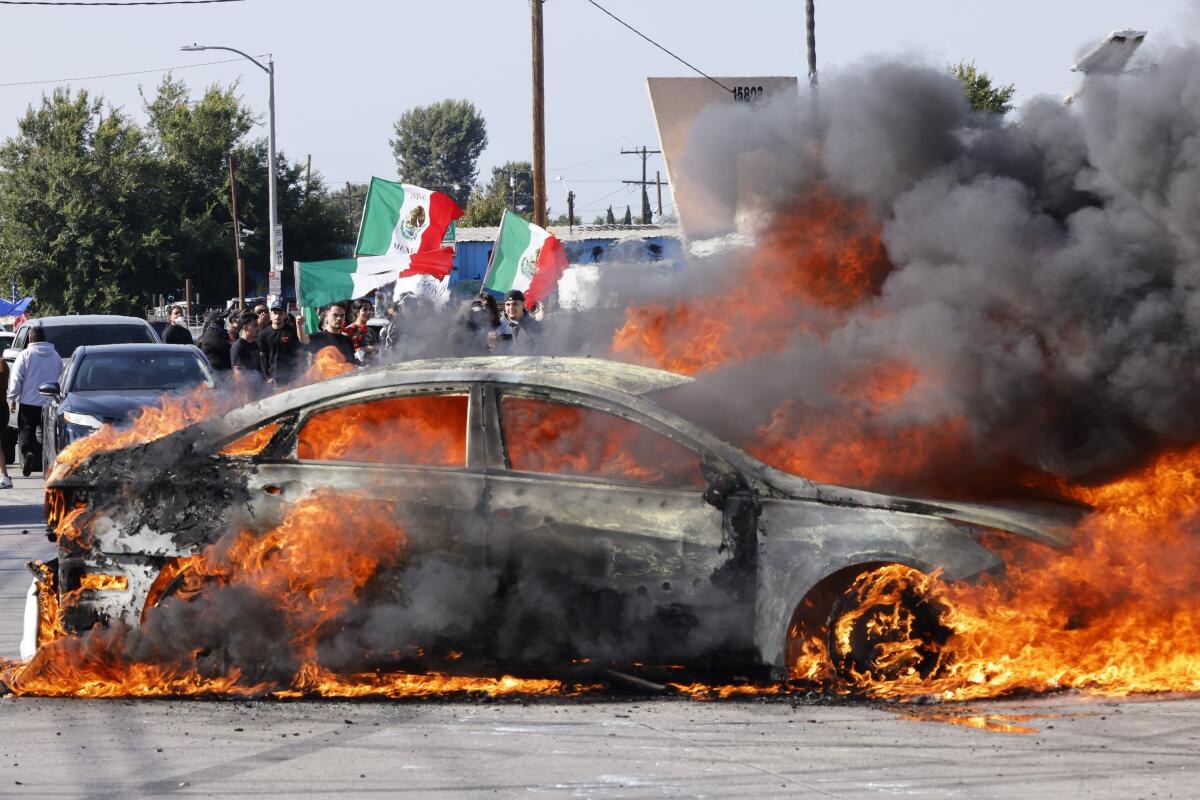The legal issues raised by Trump sending the National Guard to L.A.

- Share via
- President Trump is deploying National Guard troops to Los Angeles, despite objections from Gov. Gavin Newsom, by invoking presidential powers that have only rarely been used.
- A leading constitutional scholar said it is “chilling” for the president to take over the California National Guard to put down protests.
The Trump administration announced Saturday that National Guard troops were being sent to Los Angeles — an action Gov. Gavin Newsom said he opposed. President Trump is activating the Guard by using powers that have been invoked only rarely.
Trump said in a memo to the Defense and Homeland Security departments that he was calling the National Guard into federal service under a provision called Title 10 to “temporarily protect ICE and other United States Government personnel who are performing Federal functions.”
What is Title 10?
Title 10 provides for activating National Guard troops for federal service. Such Title 10 orders can be used for deploying National Guard members in the United States or abroad.
Erwin Chemerinsky, one of the nation’s leading constitutional law scholars, said “for the federal government to take over the California National Guard, without the request of the governor, to put down protests is truly chilling.”
“It is using the military domestically to stop dissent,” said Chemerinsky, dean of the UC Berkeley School of Law. “It certainly sends a message as to how this administration is going to respond to protests. It is very frightening to see this done.”
Tom Homan, the Trump administration’s “border czar,” announced the plan to send the National Guard in an interview Saturday on Fox News as protesters continued confronting immigration agents during raids.
“This is about enforcing the law,” Homan said. “We’re not going to apologize for doing it. We’re stepping up.”
“We’re already ahead of the game. We were already mobilizing,” he added. “We’re gonna bring the National Guard in tonight. We’re gonna continue doing our job. We’re gonna push back on these people.”
Surprise U.S. Immigration and Customs Enforcement sweeps in downtown Los Angeles prompt fierce pushback from protesters and officials.
In his memo, Trump cited “numerous incidents of violence and disorder,” and said federal immigration detention facilities are threatened.
“To the extent that protests or acts of violence directly inhibit the execution of the laws, they constitute a form of rebellion against the authority of the Government of the United States,” the president’s memo says.
Trump called into federal service at least 2,000 National Guard troops for 60 days — or “at the discretion of the Secretary of Defense.”
Newsom criticized the federal action, saying that local law enforcement was already mobilized and that sending in troops was a move that was “purposefully inflammatory” and would “only escalate tensions.”
The governor called the president and they spoke for about 40 minutes, according to the governor’s office.
Defense Secretary Pete Hegseth warned in a post on X that “if violence continues, active-duty Marines at Camp Pendleton will also be mobilized — they are on high alert.”
Newsom condemned that as a threat to deploy Marines against U.S. citizens and said: “This is deranged behavior.”
Other rarely used powers
Critics have raised concerns that Trump also might try to invoke the Insurrection Act of 1807 to activate troops as part of his campaign to deport large numbers of immigrants without proper documents.
The president has the authority under the Insurrection Act to federalize the National Guard units of states to suppress “any insurrection, domestic violence, unlawful combination, or conspiracy” that “so hinders the execution of the laws” that any portion of the state’s inhabitants are deprived of a constitutional right and state authorities are unable or unwilling to protect that right.
The American Civil Liberties Union said Trump’s use of the military domestically is misguided and dangerous.
“President Trump’s deployment of federalized National Guard troops in response to protests is unnecessary, inflammatory, and an abuse of power,” said Hina Shamsi, director of the ACLU’s National Security Project. “By taking this action, the Trump administration is putting Angelenos in danger, creating legal and ethical jeopardy for troops, and recklessly undermining our foundational democratic principle that the military should not police civilians.”
According to the ACLU, Title 10 activation of National Guard troops has historically been rare and Congress has prohibited troops deployed under the law from providing “direct assistance” to civilian law enforcement — under both a separate provision of Title 10 as well as the Posse Comitatus Act.
The Insurrection Act, however, is viewed as an exception to the prohibitions under the Posse Comitatus Act.
In 1958, President Eisenhower invoked the Insurrection Act to deploy troops to Arkansas to enforce the Supreme Court’s decision ending racial segregation in schools, and to defend Black students against a violent mob.
Chemerinsky said invoking the Insurrection Act and nationalizing a state’s National Guard have been reserved for extreme circumstances in which there are no other alternatives to maintain the peace. Chemerinsky said he feared the Trump administration is seeking “to send a message to protesters of the willingness of the federal government to use federal troops to quell protests.”
Sen. Adam Schiff (D-Calif.) said in a social media post that “there is nothing President Trump would like more than a violent confrontation with protestors to justify the unjustifiable — invocation of the Insurrection Act or some form of martial law.”
In 1992, California Gov. Pete Wilson requested that President George H.W. Bush use the National Guard to quell the unrest in Los Angeles after police officers were acquitted in the beating of Rodney King. That was under a different provision of federal law that allows the president to use military force in the United States. That provision applies if a state governor or legislature requests it.
Jessica Levinson, a law professor at Loyola Marymount University Law School, said the president “is embracing a very broad view of executive power.”
“If the president does use the Insurrection Act,” Levinson said, “we’re going to see big legal battles in the next hours, days and weeks about whether or not those broad grants of authority can be used given these circumstances.”
She noted that while Newsom and Los Angeles Mayor Karen Bass have described the incidents as protests, the president has described it as a violent uprising.
“Everyone should pause when the president is using emergency powers and the governor and the mayor are saying, please don’t, we don’t need this,” Levinson said.
The Los Angeles Police Department said in a statement that demonstrations on Saturday “remained peaceful … and we commend all those who exercised their First Amendment rights responsibly.”
Chemerinsky wrote in an opinion article that the use of the military to quell protests “is something associated with dictators in foreign countries,” and that any military deployments in domestic situations “should be regarded as a last resort in the United States.”
“Unfortunately, President Trump likely has the legal authority to do this,” Chemerinsky wrote.
“This is not to deny that some of the anti-ICE protests turned violent. But they were limited in size and there is no reason to believe that law enforcement could not control them,” Chemerinsky said. “In the context of everything that we have seen from the Trump administration’s authoritarian actions, this recent action should make us even more afraid.”
California politics editor Phil Willon contributed to this report.
More to Read
Sign up for Essential California
The most important California stories and recommendations in your inbox every morning.
You may occasionally receive promotional content from the Los Angeles Times.
















